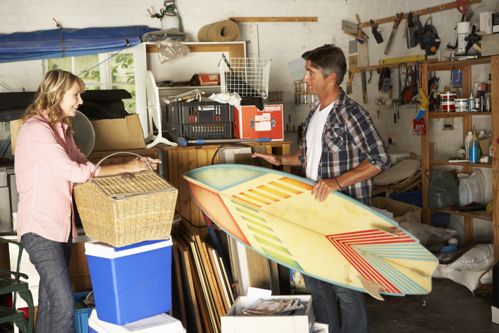For many households, the garage isn’t just a place to park the car. It’s also a valuable, much-needed storage space. Odds and ends, old furniture, bulky camping gear, seasonal and holiday decorations and large items that don’t fit in your closet — chances are, they’ve ended up in your garage. After years of using it to store all the bric-a-brac of your home, it’s likely you don’t even know what’s there anymore.
Organizing your garage might sound like a daunting task, but you don’t need professional help to do it. Here, we’ll share our top nine garage storage ideas and tips so you can maximize your space and keep it tidy in the long run.
1. Decide What to Keep
Before you start organizing your garage, take stock of what you already have and categorize everything into one of three groups: (1) items you want to keep, (2) items you want to give away, such as old pieces of patio furniture or kids’ toys that are still in mint condition but are no longer serving your needs, and (3) items that are expired, worn or ready to be thrown away. Wherever possible, minimize waste and find opportunities to upcycle items to find more loving homes for them.
The easiest way to get rid of objects is to reach out to family members, friends or neighbors who’d be interested in taking things off your hands, but you can also host a garage sale, donate them to a thrift store or sell them on Craigslist or Facebook Marketplace.
2. Keep Things Off the Floor
One of the goals of organizing your garage is to keep the floors clear. Not only will this eliminate unsightly piles and create more room for you to easily pull up and park your cars, but you and your kids can also avoid running into tripping hazards as you navigate the garage. After you’ve added ample storage options along the walls and ceiling by using the garage storage ideas below, consider sweeping and power washing the surface and sealing it with a clear epoxy top coat to keep out any dust and dirt as well as make it more resistant to weather and wear.
3. Make Use of Pegboards
Pegboards are an easy-to-mount and practical way to store anything from tools and supplies to skateboards and shelves. You can install them on any of your garage walls, though we recommend hanging one right behind your workbench or workstation for your hammers, saws, wrenches and other tools to keep them in arm’s reach when you need them. Before you invest in a pegboard, think carefully about what exactly you plan on using it for — plastic options are lightweight and great for small items, but galvanized steel racks are better solutions for heavy items (some can even hold up to 200 pounds per panel) like shovels and lawn equipment tools.
Shop the galvanized steel pegboard on Amazon ($34.99 at the time of writing).
Tip: What to Store on Your Pegboards
- Tools and craft supplies, organized by size
- Small shelves for equipment battery docks (use a cable staple)
- Pencils, files, zip ties and other small items (attach a cut PVC pipe over a pegboard hook to create a “cubby”)
4. Install Open Shelves
Cabinets are a great way to discreetly store small items that need protection from dirt and dust, but in most cases we’d advise you to opt for open shelves. Not only are they easier — and more affordable — to set up, but they’ll allow you to scan and access items whenever you need them. (Plus, they’re great at incentivizing you to keep your garage tidy since they won’t give you the chance to hide things behind a closed door.) Wire racks with wheels are great for sliding in and out of corners (this one can hold up to 600 pounds), while this resin shelving unit is adjustable to configure into any sized space and can hold up to 750 pounds.
Shop six-tier heavy-duty wire shelving racks on Amazon (various prices).
Shop the Gracious Living Knect-A-Shelf from Ace Hardware ($39.99 at the time of writing).
Tip: Garage Shelf Ideas
- Gardening supplies (like pots, soil and more)
- Car supplies (extra mats, roof rack, tire inflators, wiper fluid)
- Sporting gear or camping gear
- Extra blankets, towels and other items stored in clear plastic containers
- Outdoor kids’ toys such as pool accessories, lawn chairs and more
5. Clear Out Items That Don’t Belong in the Garage
Your garage may seem like the perfect place to put anything you’d find in a closet, pantry or similar storage space, but it’s not a catch-all storage solution. In fact, the following items should never be kept in your garage, and part of your decluttering process should involve finding a new home for them.
- Wine. Garage temperatures fluctuate dramatically, causing wine bottles to expand and contract (as well as affecting the integrity of the wine itself). Instead, use a wine fridge or check out our guide: Everything You Need to Know About Storing Wine.
- Cardboard boxes. They’re a convenient way to keep old items — especially if you’re reusing old moving boxes — but cardboard tends to become the perfect home for insects and other pests. Plus, you can’t see the inside of cardboard boxes. Opt for clear storage containers with clasp lids instead.
- Paintings, photographs and other artwork. Temperature and humidity changes can cause molding, cracking and chipping of works of art, so it’s best to opt for a temperature-steady environment like a dark closet or storage unit.
- Propane storage. One spark could ignite flames and set your garage — and home — on fire. Always keep propane tanks outdoors, as far from your house as possible.
- Paint. Many people keep paint in their garage (after all, where else would you put it?) but unless you go through entire cans of paint regularly, unstable temperatures can ruin your colors before you even get a chance to use them. Opt for a temperature-controlled environment instead.
- Food. It goes without saying, but storing food in your garage can attract all kinds of critters, including raccoons, roaches, possums, ants and others. Keep food items in airtight containers in your pantry instead. See our 5 Easy Tips to Organize Your Pantry.
6. Seal Any Gaps
Check for gaps in the walls or underneath the doors of your garage as you’re decluttering. Holes allow for air leaks and moisture to seep inside your garage, leading to potential mold and mildew growth as well as spoiling items that are temperature-sensitive. You can seal gaps with caulk or spray foam and use a rubberized strip to seal the space where your garage door makes contact with the ground to keep rodents, water and leaves outside.
7. Designate Spaces for Specific Storage Needs
Storing items in your garage strategically can help you locate them more quickly and keep heavy-use items closer to eye level for easy access. For instance, store your holiday and seasonal decor and other infrequently used items higher up on wire shelves or racks, and reserve lower shelves for things you use more often. While it may be tempting to use any open pegboard hooks or empty corners to stash whatever objects will fit, try to keep like with like. Bikes and sports equipment should be stored in the same area, and the same idea applies to gardening tools, craft supplies, snow tires, camping gear, power charges and cords, etc.
| Recommended reading: How to Store Your Camping Equipment |
8. Buy Retractable Cord Reels for Easy Power Access
Extension cords can add a lot of unnecessary clutter and make your garage floor a labyrinth of tripping hazards. Instead of wasting time detangling power cords or risk them accidentally getting crushed, get a retractable cord reel that will allow you easy access to power wherever you are in your garage (or along the exterior of your house). Some cord reels will also come with extra grounded outlets and AWG cables to connect to power saws, drills and other equipment.
Shop the 75-ft. Extension Cord Storage Reel from Home Depot ($129 at the time of writing).
9. Consider Extra Storage
Despite your best efforts, you may still not have enough space in the garage. In that case, it may be worth using a personal storage facility to hold some of your infrequently used items. In fact, about 65 percent of self-storage renters have a garage, but still choose to rent a unit. This way, you can still use your garage for its intended purpose without getting rid of items you want or need to keep.
One final reminder: organizing your garage doesn’t have to be a big undertaking, though it may feel like a Herculean task at first. You can even ask your family members or kids to help clean up. For more tips on storage and organization, check out our blog.











